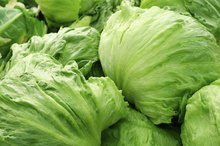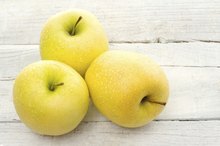What does fact checked mean?
At Healthfully, we strive to deliver objective content that is accurate and up-to-date. Our team periodically reviews articles in order to ensure content quality. The sources cited below consist of evidence from peer-reviewed journals, prominent medical organizations, academic associations, and government data.
- Linus Pauling Institute Micronutrient Information Center: Carotenoids
- National Institutes of Health Office of Dietary Supplements: Vitamin A and Carotenoids
- MedlinePlus: Beta-Carotene
The information contained on this site is for informational purposes only, and should not be used as a substitute for the advice of a professional health care provider. Please check with the appropriate physician regarding health questions and concerns. Although we strive to deliver accurate and up-to-date information, no guarantee to that effect is made.
Fruit with Beta-Carotene
Your body converts the beta-carotene you consume in foods into the amount of vitamin A it needs 34. An essential nutrient, vitamin A helps to maintain your immune system, vision, skin and mucus membranes. Including foods rich in beta-carotene in your everyday diet helps your body meet its vitamin A requirement without supplements 34. Fruits with yellow or orange flesh contain significant amounts of beta-carotene, and a deeper color usually indicates a higher concentration of beta-carotene 3.
Melons
With its bright-orange flesh, cantaloupe tops the list of fruit sources of beta-carotene 3. A cup of cantaloupe balls contains 3,575 micrograms of beta-carotene, and a cup of reddish-pink watermelon balls provides 467 micrograms 3. Green-fleshed honeydew melon contains only 53 micrograms of beta-carotene per cup 3.
Stone Fruits
Fruits That Do Not Contain Folate
Learn More
A fresh apricot has 383 micrograms of beta-carotene, and 1/4 cup of dried apricots contains 703 micrograms 3. A medium-sized peach contains 243 micrograms of beta-carotene, a medium-size nectarine has 213 micrograms and a fresh plum has 125 micrograms 3. A cup of sour red cherries provides 793 micrograms of beta-carotene, while a cup of sweet cherries has only 52 micrograms 3.
Citrus
Among citrus fruits, pink or red grapefruits have the most beta-carotene, offering 844 micrograms per half of one fruit; white grapefruit has only 17 micrograms of beta-carotene per half fruit 3. A medium-sized tangerine has 136 micrograms of beta-carotene, while a medium-sized orange contains 93 micrograms and a half-cup of canned mandarin oranges packed in fruit juice and drained has 282 micrograms 3. Lemons and limes contain negligible amounts of beta-carotene 3.
Tropical
Calories in One Kiwi Fruit
Learn More
A cup of fresh passion fruit has 1,753 micrograms of beta-carotene 3. A cup of raw purple passion fruit juice provides 1,035 micrograms of beta-carotene, while a cup of raw yellow passion fruit juice has 1,297 micrograms 3. A cup of fresh mango chunks contains 1,056 micrograms; you'll get 617 micrograms of beta-carotene from a cup of guava pieces and 397 micrograms from a cup of papaya chunks 3. A cup of pineapple chunks has only 58 micrograms of beta-carotene 3.
Related Articles
References
- Linus Pauling Institute Micronutrient Information Center: Carotenoids
- National Institutes of Health Office of Dietary Supplements: Vitamin A and Carotenoids
- MedlinePlus: Beta-Carotene
- American Cancer Society: Vitamin A and Beta Carotene
- SkipThePie.org: Nutrition Search Engine
- Grune T, Lietz G, Palou A, et al. Beta-Carotene Is an Important Vitamin A Source for Humans. J Nutr. 2010;140(12):2268S-2285S. doi:10.3945/jn.109.119024
- Chew EY, Clemons TE, Agrón E, et al. Long-term effects of vitamins C and E, β-carotene, and zinc on age-related macular degeneration: AREDS report no. 35. Ophthalmology. 2013;120(8):1604-1611.e4. doi:10.1016/j.ophtha.2013.01.021
- Age-Related Eye Disease Study Research Group. A randomized, placebo-controlled, clinical trial of high-dose supplementation with vitamins C and E, beta carotene, and zinc for age-related macular degeneration and vision loss: AREDS report no. 8. Arch Ophthalmol. 2001;119(10):1417-1436.
- Neuman I, Nahum H, Ben-Amotz A. Prevention of exercise-induced asthma by a natural isomer mixture of beta-carotene. Ann Allergy Asthma Immunol. 1999;82(6):549-553. doi:10.1016/S1081-1206(10)63165-1
- Mcalindon TE, Jacques P, Zhang Y, et al. Do antioxidant micronutrients protect against the development and progression of knee osteoarthritis? Arthritis Rheum. 1996;39(4):648-656. doi:10.1002/art.1780390417
- Greenberger S, Harats D, Salameh F, et al. 9-cis-rich β-carotene powder of the alga Dunaliella reduces the severity of chronic plaque psoriasis: a randomized, double-blind, placebo-controlled clinical trial. J Am Coll Nutr. 2012;31(5):320-326. doi:10.1080/07315724.2012.10720430
- MedlinePlus. Beta-Carotene. Updated March 16, 2020.
- National Center for Complementary and Integrative Health. Antioxidants: In Depth. Updated November 2013.
- Paiva SA, Russell RM. Beta-Carotene and Other Carotenoids as Antioxidants. J Am Coll Nutr. 1999 Oct;18(5):426-33.
- Pryor WA, Stahl W, Rock CL. Beta Carotene: From Biochemistry to Clinical Trials. Nutr Rev. 2000 Feb;58(2 Pt 1):39-53. doi:10.1111/j.1753-4887.2000.tb07810.x
Writer Bio
A professional writer since 1997, Harvard graduate and pro rock climber Alli Rainey's articles have appeared in "Climbing Magazine," "Rock & Ice" and "Men's Fitness," among many others. Rainey is also an ACTION certified personal trainer (CPT) and climbing coach.









